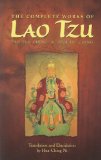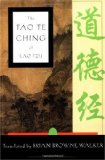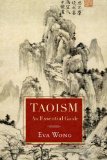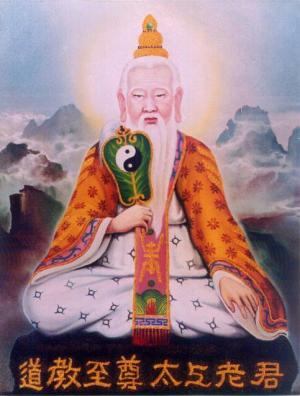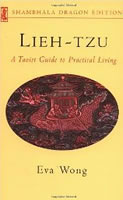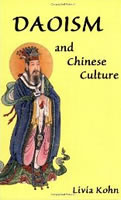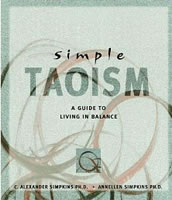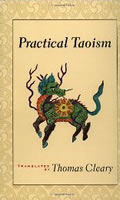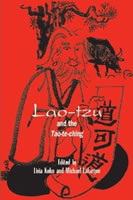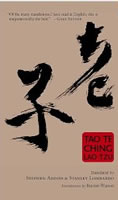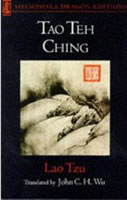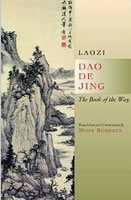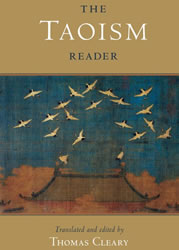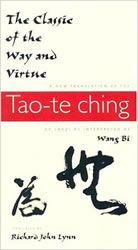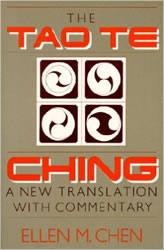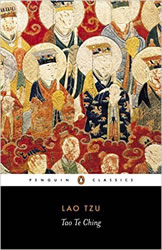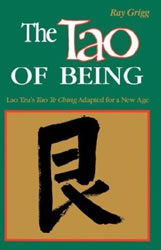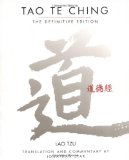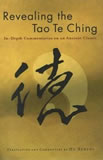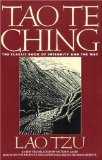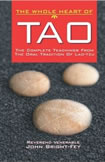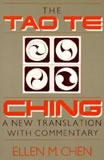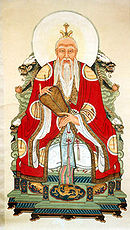Chapter 32, Tao Te Ching (Dao De Jing) by Lao Tzu (Laozi): English Translations, Commentary, Pinyin, Taoism, Books, References (original) (raw)
Compiled and Indexed by Michael P. Garofalo, M.S.
Green Way Research, Valley Spirit Center, Gushen Grove Notebooks, Vancouver, Washington
Chapter 31 Chapter 33 Index to All 81 Chapters Daoism Concordance Cloud Hands Blog Commentary
Chapter 32
Tao Te Ching(Dao De Jing) by Lao Tzu
Classic Book (Ching) about the Tao (Way, Nature, Patterns, Processes) and Te (Virtue, Potency, Power, Integrity, Wise Person, Sage)
Concordance: Indexing, Search Terms, Topics, Themes, Keys, Subjects
English and Chinese (Wade-Giles) Terms, Chapter #32: Abide or Anchor (chih), Can or Able (n�ng), Danger or Trouble (tai), Dao, Dew, Drip or Fall (chiang), Earth (ti), Earth, Effortlessly, Equality, Eternal or Everlasting ch'ang), Free, Future (chiang), Guidance, Harmony or Peace (ch�n), Heaven (t'ien), Hold or Keep (shou), Honor or Homage (pin), Indestructible, Ineffable, Join or Combine (ho), King (wang), King, Know or Realize (chih), Law and Order (ling), Mutual (hsiang), Name (ming), Nameless, People (min), Picture or Illustrate (p'i), Prince or Baron (hou), Pure or Simple (p'u), Rain (lu), Rest, Rivers (ch'uan) that Run to the Sea (hai), Rivers, Rule or Master (ch'�n), Rules and Regulations (chih), Seas, Shapes, Stopping, Streams, Subtle or Small (hsiao), Sweet (kan), Tao with No Name, Tao, Ten Thousand Things (wang wu), The Virtue of Holiness, Unfathomable, Valley Streams; 聖德Mysterious, Ocean, Language, Small, Settle, Peaceful, Ignorant, Stop, Don�t Force, Sage, Harmony, Earthly, Common Sense, Restraint.
Chapter #32 Tao Te Ching 2/10i/2021
T�rminos en Espa�ol, Cap�tulo #32: Personas, Dulce, Ley, Orden, Normas, Reglamentos, Darse, Cuenta, Permaneced, Ancla, Peligro,Problemas, Sin Nombre, Inefabel, Mares, R�os , Cielo, Tierra, Eterno, Rey, Gratuito, Orientaci�n, Arroyos, Roc�o,Parar, Armon�a, Formas, Igualdad, Lluvia, Sencillez, Indestructible, Insondable, Valle, Arroyos, Puro, Simple, Sutil, Peque�o, Cielo, Capaz,Regla, Maestro,Pr�ncipe, Rey,Espera, Mantenga,Homenaje, Tierra, Mutuo, �nete,Goteo, Oto�o, Ilustrar, Mar; Misterioso, Oc�ano, Lenguaje, Peque�o, Asentamiento, Pac�fico, Ignorante, Detener, No Forzar, Sabio, Armon�a, Tierra, Sentido Com�n, Restricci�n.
Cap�tulo #32_Daodejing_ 2/10i/2021
Electronic Concordance for all 81 Chapters of the Tao Te Ching
English Language Translations of the Tao Te Ching
"The Tao, considered as unchanging, has no name.
Though in its primordial simplicity it may be small, the whole world dares not deal with one embodying it as a minister.
If a feudal prince or the king could guard and hold it, all would spontaneously submit themselves to him.
Heaven and Earth under its guidance unite together and send down the sweet dew,
which, without the directions of men, reaches equally everywhere as of its own accord.
As soon as it proceeds to action, it has a name.
When it once has that name, men can know to rest in it.
When they know to rest in it, they can be free from all risk of failure and error.
The relation of the Tao to all the world is like that of the great rivers and seas to the streams from the valleys."
- Translated by James Legge, 1891, Chapter 32
"The eternity of Dao has no name:
Even though Pure Matter is infinitely small, its function is so superior that it is next to none,
If rulers can follow the model of nature, everything under the heaven will render homage to them,
Then the people would automatically be equally sufficient without being directed.
It was named after the initiation of regulations, when names were given,
Then one will know how to rest.
To know how to stop will not reach a perilous end.
The application of Dao to the world is like the relation of oceans to rivers."
- Translated by Zi-Chang Tang, Chapter 32
"The Tao, eternally nameless
Its simplicity, although imperceptible
Cannot be treated by the world as subservient
If the sovereign can hold on to it
All will follow by themselves
Heaven and Earth, together in harmony
Will rain sweet dew
People will not need to force it; it will adjust by itself
In the beginning, there were names
Names came to exist everywhere
One should know when to stop
Knowing when to stop, thus avoiding danger
The existence of the Tao in the world
Is like streams in the valley into rivers and the ocean."
- Translation by Derek Lin, 2006, Chapter 32
"The eternal Way has no name.
The earliest simplicity has no significance,
But its function is supreme.
If kings and officials can keep the Way,
The whole world will become their guest.
Harmony between heaven and earth creates rains and dews,
Which all share equally without laws or rules.
With the growth of the earliest system,
There appeared names, which are therefore conventional.
Knowing what is conventional,
One can also understand where and when to stop.
Knowing where and when to stop,
One will never meet with countering forces.
The Way is to the world what rivers are to the ocean."
- Translated by Liu Qixuan, Chapter 32

This webpage work is licensed under a Creative Commons Attribution-NonCommercial-NoDerivatives 4.0 International License.
Created by Michael P. Garofalo, Green Way Research, Valley Spirit Center, Gushen Grove Notebooks, Vancouver, Washington � 2011-2021 CCA 4.0
The Complete Works of Lao Tzu: Tao Teh Ching & Hua Hu Ching Translation and elucidation by Hua Ching Ni.
Translation and elucidation by Hua Ching Ni.
The Tao Te Ching of Lao Tzu Translated by Brian Walker.
Translated by Brian Walker.
Tao - The Way Translated by Lionel and and Herbert Giles.
Translated by Lionel and and Herbert Giles.
Taoism: An Essential Guide By Eva Wong.
By Eva Wong.
"Tao is absolute and has no name.
Though the uncarved wood is small,
It cannot be employed (used as vessel) by anyone.
If kings and barons can keep (this unspoiled nature),
The whole world shall yield them lordship of their own accord.
The Heaven and Earth join,
And the sweet rain falls,
Beyond the command of men,
Yet evenly upon all.
Then human civilization arose and there were names.
Since there were names,
It were well one knew where to stop.
He who knows where to stop
May be exempt from danger.
Tao in the world
May be compared to rivers that run into the sea."
- Translated by Lin Yutang, 1948, Chapter 32
"The eternal Tao is nameless; though it be
Too insignificant a name to have,
In its primordial simplicity
The whole world dare not make of it a slave.
If prince or king could keep it, everything
Would homage pay to him spontaneously,
And Heaven and Earth, combined, sweet dews would bring,
And people know no rule but harmony.
But when it takes control, it has a name,
And, knowing when to stop, men rest at ease,
For to the Tao the whole world is the same
sriver streams compared with mighty seas."
- Translated by Isaac Winter Heysinger, 1903, Chapter 32
"Tao is forever of no name. Small as it may be, Tao as the uncarved block cannot be used by anyone in the universe. If kings and lords could follow it well, Ten Thousand Things will spontaneously obey them. Heaven and earth would make love to each other, Sweet dew will thereby fall gently. With no decrees, people will be naturally ruled. When the whole uncarved block is divided, The pieces become instruments and in need of their names. When there are already many names, It is also necessary to know their limitations. When their limitations are known, There are no things in danger. Tao is manifest in the universe, Like the water flows from the rivers and the valleys into Yan Ze River and ocean." - Translated by Eichi Shimomisse, 1998, Chapter 32
The Complete Works of Lao Tzu: Tao Teh Ching & Hua Hu Ching Translation and elucidation by Hua Ching Ni
Translation and elucidation by Hua Ching Ni
The Tao Te Ching of Lao Tzu Translated by Brian Walker
Translated by Brian Walker
Tao Te Ching Translated by Arthur Waley
Translated by Arthur Waley
Tao - The Way Translated by Lionel and and Herbert Giles
Translated by Lionel and and Herbert Giles
Taoism: An Essential Guide By Eva Wong
By Eva Wong
"Tao remains ever nameless.
However insignificant may be the simplicity of those who cultivate it
The Empire does not presume to claim their services as Ministers.
If Princes and Monarchs could but preserve this simplicity,
Every creature in the world would submit itself to them;
Heaven and Earth would be in mutual accord,
And shower down sweet dew;
The people would need no laws, but live in harmony of themselves.
It was in the beginning that a name was fabricated for the Tao.
This name once existing, Heaven, also, may be known;
And such knowledge ensures the indestructibility of the doctrine.
The presence of Tao in the world may be compared to streams which ever flow,
And mountain-gorges which are indestructible,
In their union with rivers and seas which are unfathomable."
- Translated by Frederic H. Balfour, 1884, Chapter 32
A Chinese Language Version of Chapter 32 of the Tao Te Ching by Lao Tzu Anoteon my style of displaying the Chinese characters of the Tao Te Ching
道常無名.
樸雖小, 天下莫能臣也.
侯王若能守之, 萬物將自賓.
天地相合, 以降甘露, 民莫之令而自均.
始制有名.
名亦既有.
夫亦將知止.
知止所以不殆.
譬道之在天下.
猶川谷之與江海.
- Chinese characters, Tao Te Ching, Chapter 32
tao ch'ang wu ming.
p'u sui hsiao, t'ien hsia mo n�ng ch'�n yeh.
hou wang jo n�ng shou chih, wan wu chiang tzu pin.
t'ien ti hsiang ho, yi chiang kan lu, min mo chih ling erh tzu ch�n.
shih chih yu ming.
ming yi chi yu.
fu yi chiang chih chih.
chih chih so k'o pu tai.
p'i tao chih tsai t'ien hsia.
yu ch'uan ku chih y� chiang hai.
- Wade-Giles Romanization, Tao Te Ching, Chapter 32
Audio Version in Chinese of Chapter 32 of the Tao Te Ching
dao chang wu ming. pu sui xiao, tian xia mo neng chen ye. hou wang ruo neng shou zhi, wan wu jiang zi bin. tian di xiang he, yi jiang gan lu, min mo zhi ling er zi jun. shi zhi you ming. ming yi ji you. fu yi jiang zhi zhi. zhi zhi ke yi bu dai. pi dao zhi zai tian xia. you chuan gu zhi yu jiang hai.
- Pinyin Romanization, Daodejing, Chapter 32
Tao Te Ching in Chinese characters and English (includes a word by word key) from YellowBridge
Tao Te Ching in Chinese characters, Pinyin Romanization, English and German by Dr. Hilmar Alquiros.
Laozi Daodejing: Chapters with Chinese characters, seal script, detailed word by word concordance, Pinyin (tone#), German, French and English.
Chinese and English Dictionary, MDGB
Dao De Jing Wade-Giles Concordance by Nina, Dao is Open
Dao De Jing English and Wade-Giles Concordance by Mike Garofalo
Tao Te Ching in Pinyin Romanization with Chinese characters, WuWei Foundation
Tao Te Ching in Pinyin Romanization
Tao Te Ching in Chinese characters and English
Tao Te Ching in Chinese characters, English, Word by word analysis, Zhongwen
Tao Te Ching: The Definitive Edition
Tao Te Ching in Chinese characters: Big 5 Traditional and GB Simplified
Chinese Characters, Wade-Giles and Pinyin Romanizations, and 16 English Translations for Each Chapter of the Daodejing by Mike Garofalo.
Tao Te Ching in Chinese characters, Pinyin and Wade Giles Romanization spellings, English; a word for word translation of the Guodian Laozi Dao De Jing Version.
Lao Zi's Dao De Jing: A Matrix Translation with Chinese Text by Bradford Hatcher.
"Tao is always without a name,
Simple and small.
Beneath-heaven dares no subject it.
If kings and barons can hold to it,
The ten thousand things will pay homage.
Heaven and earth will mutually join
And sweet dew will fall.
Not by law but of themselves
The people will stay in balance.
When law and order arose,
Names appeared.
Aren�t there enough already?
Is it not time to stop?
To know when to stop
Is to be free from danger.
Tao is to all beneath heaven
As rivers and seas are to rivulets and streams."
- Translated by Herrymoon Maurer, 1985, Chapter 32
Lieh-Tzu: A Taoist Guide to Practical Living Translated by Eva Wong
Translated by Eva Wong
The Daodejing of Laozi Translated by Philip Ivahoe
Translated by Philip Ivahoe
Daoism: A Beginner's Guide By James Miller
By James Miller
Early Daoist Scriptures Translated by Stephen Bokencamp
Translated by Stephen Bokencamp
Lifestyle Advice from Wise Persons
Simple Taoism: A Guide to Living in Balance By Alexander and Annellen Simpkins
By Alexander and Annellen Simpkins
Practical Taoism Translated by Thomas Cleary
Translated by Thomas Cleary
Daoism and Chinese Culture By Livia Kohn
By Livia Kohn
"Reason, in its eternal aspect, is unnamable.
Although its simplicity seems insignificant, the whole world does not dare to suppress it.
If princes and kings could keep it, the ten thousand things would of themselves pay homage.
Heaven and earth would unite in dripping sweet dew, and the people with no one to command them would of themselves be righteous.
As soon as Reason creates order, it becomes namable.
Whenever the namable in its turn acquires existence, one learns to know when to stop.
By knowing when to stop, one avoids danger.
To illustrate Reason's relation to the world we compare it to streams and creeks in their course towards rivers and the ocean."
- Translated by Daisetsu Teitaro Suzuki and Paul Carus, 1913, Chapter 32
"Tao is forever undefined.
Like uncarved wood, it seems insignificant; yet no one can command it.
If rulers could abide with it, they would rule everything.
The universe would unify and rain the dew of peace,
beyond anyone's command, evenly on all.
When the uncarved wood is cut up, the parts need names.
One must know when to stop cutting.
All things flow to Tao, like rivers flowing to the sea."
- Translated by Ned Ludd, Chapter 32
How to Live a Good Life: Advice from Wise Person
"Existence is infinite, not to be defined;
And, though it seem but a bit of wood in your hand, to carve as you please,
It is not to be lightly played with and laid down.
When rulers adhered to the way of life,
They were upheld by natural loyalty:
Heaven and earth were joined and made fertile,
Life was a freshness of rain,
Subject to none,
Free to all.
But men of culture came, with their grades and their distinctions;
And as soon as such differences had been devised
No one knew where to end them,
Though the one who does know the end of all such differences
Is the sound man:
Existence
Might be likened to the course
Of many rivers reaching the one sea."
- Translated by Witter Bynner, 1944, Chapter 32

This webpage work is licensed under a Creative Commons Attribution-NonCommercial-NoDerivatives 4.0 International License.
Created by Michael P. Garofalo, Green Way Research, Valley Spirit Center, Gushen Grove Notebooks, Vancouver, Washington � 2011-2021 CCA 4.0
Tao Te Ching
Lao Tzu: Tao Te Ching
Lao-Tzu and the Tao-Te-Ching
Dao De Jing: The Book of the Way
"The Tao can't be perceived.
Smaller than an electron,
it contains uncountable galaxies.
If powerful men and women
could remain centered in the Tao,
all things would be in harmony.
The world would become a paradise.
All people would be at peace,
and the law would be written in their hearts.
When you have names and forms,
know that they are provisional.
When you have institutions,
know where their functions should end.
Knowing when to stop,
you can avoid any danger.
All things end in the Tao
as rivers flow into the sea."
- Translated by Stephen Mitchell, 1988, Chapter 32
"Tao has always been nameless;
an Uncarved Block, simple and small, but subject to none under Heaven.
All things will obey the Monarch who defends it.
Heaven uniting with Earth, as sweet dew falling.
People not commanded, but true to themselves.
First there were names, then more names.
It is time to stop.
Knowing when to stop avoids exhaustion.
Tao flows from Heaven, as Rivers flow into the Sea."
- Translated by Karl Kromal, 2002, Chapter 32
"Tao is always nameless.
Small as it is in its Primal Simplicity,
It is inferior to nothing in the world.
If only a ruler could cling to it,
Everything will render homage to him.
Heaven and Earth will be harmonized
And send down sweet dew.
Peace and order will reign among the people
Without any command from above.
When once the Primal Simplicity diversified,
Different names appeared.
Are there not enough names now?
Is this not the time to stop?
To know when to stop is to preserve ourselves from danger.
The Tao is to the world what a great river or an ocean
is to the streams and brooks."
- Translated by John C. H. Wu, 1961, Chapter 32
Tao Te Ching Commentary, Interpretations, Research Tools, Resources Chapter 32
Das Tao Te King von Lao Tse. Complete versions of all 81 Chapters of the Tao Te Ching by many different translators in many languages: 124 English, 24 German, 14 Russian, 7 Spanish, 5 French and many other languages. Links are organized first by languages, and then alphabetically by translators. Formatting varies somewhat. The original website at Onekellotus went offline in 2012; but, the extensive collection of these Tao Te Ching versions was saved for posterity by the Internet Archive Wayback Machine and available as of 9/9/2015. This is an outstanding original collection of versions of the _Daodejing_─ the Best on the Internet. Caution: copyright infringement may sometimes be an issue at this website.
Tao Te Ching, Translations into English: Terebess Asia Online (TAO). 124 nicely formatted complete English language translations, on separate webpages, of the Daodejing. Alphabetical index by translators. Each webpage has all 81 chapters of the Tao Te Ching translated into English. A useful collection! Many reformatted and colored versions from the original collection atDas Tao Te King von Lao Tse. Caution: copyright infringement may sometimes be an issue at this website.
Lao Tzu: Te-Tao Ching - A New Translation Based on the Recently Discovered Ma-wang-tui Texts (Classics of Ancient China)
Daodejing by Laozi: Chapters with Chinese characters, seal script, detailed word by word concordance, Pinyin (tone#), German, French and English. This is an outstanding resource for serious students of the Tao Te Ching.
Tao Te Ching: A New Translation and Commentary. By Ellen Chen. Paragon House, 1998. Detailed glossary, index, bibliography, notes, 274 pages.
The Tao and Method: A Reasoned Approach to the Tao Te Ching. By Michael Lafargue. New York, SUNY Press, 1994. 640 pages. Detailed index, bibliography, notes, and tables. An essential research tool.
Two Visions of the Way: A Study of the Wang Pi and the Ho-Shang Kung Commentaries on the Lao-Tzu. By Professor by Alan Kam-Leung Chan. SUNY Series in Chinese Philosophy and Culture. State University of New York Press, 1991. Index, bibliography, glossary, notes, 314 pages. ISBN: 0791404560.
Tao Te Ching: The Definitive Edition
Chinese Reading of the DaodejingWang Bi's Commentary on the Laozi with Critical Text and Translation. By Professor Rudolf G. Wagner. A SUNY Series in Chinese Philosophy and Culture. English and Mandarin Chinese Edition. State University of New York Press; Bilingual edition (October 2003). 540 pages. ISBN: 978-0791451823. Wang Bi (Wang Pi, Fusi), 226-249 CE,Commentary on the Tao Te Ching.
Tao Te Ching
The Taoism Reader
Change Your Thoughts - Change Your Life: Living the Wisdom of the Tao
The Tao of Being: A Think and Do Workbook
The Lunar Tao: Meditations in Harmony with the Seasons
The Classic of the Way and Virtue: A New Translation of the Tao-te Ching of Laozi as Interpreted by Wang Bi.Translated by Richard John Lynn. Translations from the Asian Classics Series. New York, Columbia University Press, 1999. Extensive index, glossaries, notes, 244 pages.
Tao Te Ching in Chinese characters, Pinyin Romanization, English and German by Dr. Hilmar Alquiros.
Stoicism and Hellenistic Philosophy
How to Live a Good Life: Advice from Wise Persons
One Old Philosopher's Notebooks Research, Reading, and Reflections by Mike Garofalo.
Yellow Bridge Dao De Jing Comparison Table Provides side by side comparisons of translations of the Tao Te Ching by James Legge, D. T. Suzuki, and Dwight Goddard. Chinese characters for each paragraph in the Chapter are on the left; place your cursor over the Chinese characters to see the Pinyin Romanization of the Chinese character and a list of meanings.
Translators Index, Tao Te Ching Versions in English, Translators Sorted Alphabetically by Translator, Links to Books and Online Versions of the Chapters
Taoism and the Tao Te Ching: Bibliography, Resources, Links
Spanish Language Translations of the Tao Te Ching, Daodejing en Espa�ol, Translators Index
The Tao of Zen
Chapter 41 in theRambling Taoist Commentaries by Trey Smith. The Rambling Taoists are Trey Smith and Scott Bradley.
The Philosophy of the Daodejing
Valley Spirit, Gu Shen, Concept, Chapter 6 Valley Spirit Center in Red Bluff, California. Sacred Circle in the Gushen Grove.
Lao-tzu's Taoteching
Reading Lao Tzu: A Companion to the Tao Te Ching with a New Translation
Dao De Jing: A Philosophical Translation
Thematic Index to the 81 Chapters of the Tao Te Ching
Lieh-Tzu: A Taoist Guide to Practical Living
Revealing the Tao Te Ching: In-depth Commentaries on an Ancient Classic
Cloud Hands BlogMike Garofalo writes about Mind-Body Arts, Philosophy, Taoism, Gardening, Taijiquan, Walking, Mysticism, Qigong, and the Eight Ways.
The Whole Heart of Tao: The Complete Teachings From the Oral Tradition of Lao Tzu.
Gushen Grove Notebooks for the Tao Te Ching
Research and Indexing by
Michael P. Garofalo
Green Way Research, Valley Spirit Center, Gushen Grove Notebooks,
Red Bluff, California, 2011-2017; Vancouver, Washington, 2017-2021
Indexed and Compiled byMichael P. Garofalo
This webpage was last edited, changed, reformatted, improved, modified or updated on February 26, 2021.
This webpage was first distributed online on March 23, 2011.

This webpage work is licensed under a Creative Commons Attribution-NonCommercial-NoDerivatives 4.0 International License.
Created by Michael P. Garofalo, Green Way Research, Valley Spirit Center, Gushen Grove Notebooks, Vancouver, Washington � 2011-2021 CCA 4.0
Brief Biography of Michael P. Garofalo, M.S.
Ripening Peaches: Daoist Studies and Practices
Zhuangzi (Chuang Tzu, Zhuang Zhou, Master Chuang) 369�286 BCE
Taoist Perspectives: My Reading List
How to Live a Good Life: Advice from Wise Persons
Bodymind Theory and Practices, Somaesthetics
How to Live a Good Life: Advice from Wise Persons
Pleasures, Satisfaction, Desires
Qigong (Chi Kung) Health Practices
One Old Daoist Druid's Final Journey: Notebooks of the Librarian of Gushen Grove
Index to Cloud Hands and Valley Spirit Websites
Gushen Grove Notebooks for the Tao Te Ching
Bibliography
Alphabetical Subject Index (English, Spanish, Wade-Giles) for Chapters 1-25
Index to English Language Translators of the Tao Te Ching
Thematic Index 1-81
Chapter Index 1-81
Recurring Themes (Terms, Concepts, Leimotifs) in the Tao Te Ching
Spanish Language Translations of the Tao Te Ching
The Tao Te Ching (Dao De Jing) by Lao Tzu (Laozi) circa 500 BCE
